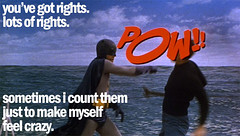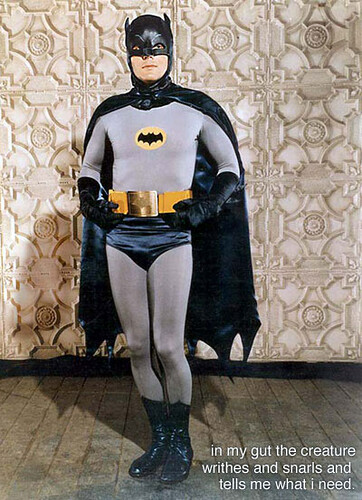When You're In A Rut
You're in a rut. Blogging the contents of my Netflix queue won't get me to stop reacting to comic-book superheroes if my Netflix queue is bringing me...comic-book superhero movies. I watched, over the past few days, three classics of the genre.
Taken as a collective, they blow.
Superman, the Richard Donner film with Christopher Reeve and Gene Hackman, is alright. Reeve is really good, actually, and Margot Kidder is some kind of charming, and Hackman belongs in a different, yet highly amusing, film. Actually, Reeve is really good as Clark Kent and merely good as Superman, in my opinion; he handles the bumbling put-on with considerable panache, and the two or three moments across both films where you see him, dressed as Kent, drop the facade, are really cool. (Didn't even notice he was slouching, but he uncoils to full height and takes off the glasses and his whole face changes. I think one time they even cheated a hairstyle change, from Kent's goobery combover to Superman's iconic forehead curl.) Some of the Superman stuff, he comes off as smirking more than, well, Superman-y. Also, I'm not down with bringing Lois back from the dead, but they also weren't originally going to kill her anyway, so it's a pointless zero-sum game.
Superman II is awful. It's a miraculously stupid movie full of some miraculously stupid people, not least of whom include main characters who were not blithering idiots during Superman, which nominally speaking was scripted and partly shot at the same time as this abortion of a film. It's really bad from a storytelling craft standpoint, and salvaged only by some fine work from Hackman and the completely out of place yet enjoyable coda at the end, where Clark Kent returns to a moment of humilation, kicks a guy's ass in blatant Superman-y fashion, and then dorkily mimes doing a bench press while shrugging his shoulders and telling an awestruck onlooker, "I've been, you know [dorky bench press] working out."
Batman was coincidentally summarized by a coworker as "candybutt," which I guess is true. I liked it less than I remembered. Basically, it strengthened my impression that, as a director, Tim Burton is a really interesting production designer. His quasi-famous disdain for actual comics doesn't really help him out here; Frank Miller's The Dark Knight Returns was apparently highly influential to everyone on set (and it's easy to see why someone who otherwise doesn't care for comics would respond to it), and the movie's tone is basically TDKR crossed with the 60s TV show starring Adam West. Superdark crossed with high camp and we wind up actually in very Burton-y territory: the frighteningly whimsical, or whimsically frightening, that doesn't do much for me, even though I kind of dug Edward Scissorhands. The tone is all wrong because it's all mixed up; a campy Batman isn't what I want to see, but it's a valid and historically grounded take on the character and his world. Michael Keaton (nice job, by the way) isn't campy, but Nicholson is, except he's killing people. Nicholson's Joker murders people, horrifically, left and right, but plays the character for over the top looniness, and what's worse is that the movie follows him. If this movie is supposed to make me laugh, it shouldn't try to make me laugh at the death of innocent people.
Far superior, as a mashup of Adam West and The Dark Knight Returns, is this work of genius. Excerpts:


Taken as a collective, they blow.
Superman, the Richard Donner film with Christopher Reeve and Gene Hackman, is alright. Reeve is really good, actually, and Margot Kidder is some kind of charming, and Hackman belongs in a different, yet highly amusing, film. Actually, Reeve is really good as Clark Kent and merely good as Superman, in my opinion; he handles the bumbling put-on with considerable panache, and the two or three moments across both films where you see him, dressed as Kent, drop the facade, are really cool. (Didn't even notice he was slouching, but he uncoils to full height and takes off the glasses and his whole face changes. I think one time they even cheated a hairstyle change, from Kent's goobery combover to Superman's iconic forehead curl.) Some of the Superman stuff, he comes off as smirking more than, well, Superman-y. Also, I'm not down with bringing Lois back from the dead, but they also weren't originally going to kill her anyway, so it's a pointless zero-sum game.
Superman II is awful. It's a miraculously stupid movie full of some miraculously stupid people, not least of whom include main characters who were not blithering idiots during Superman, which nominally speaking was scripted and partly shot at the same time as this abortion of a film. It's really bad from a storytelling craft standpoint, and salvaged only by some fine work from Hackman and the completely out of place yet enjoyable coda at the end, where Clark Kent returns to a moment of humilation, kicks a guy's ass in blatant Superman-y fashion, and then dorkily mimes doing a bench press while shrugging his shoulders and telling an awestruck onlooker, "I've been, you know [dorky bench press] working out."
Batman was coincidentally summarized by a coworker as "candybutt," which I guess is true. I liked it less than I remembered. Basically, it strengthened my impression that, as a director, Tim Burton is a really interesting production designer. His quasi-famous disdain for actual comics doesn't really help him out here; Frank Miller's The Dark Knight Returns was apparently highly influential to everyone on set (and it's easy to see why someone who otherwise doesn't care for comics would respond to it), and the movie's tone is basically TDKR crossed with the 60s TV show starring Adam West. Superdark crossed with high camp and we wind up actually in very Burton-y territory: the frighteningly whimsical, or whimsically frightening, that doesn't do much for me, even though I kind of dug Edward Scissorhands. The tone is all wrong because it's all mixed up; a campy Batman isn't what I want to see, but it's a valid and historically grounded take on the character and his world. Michael Keaton (nice job, by the way) isn't campy, but Nicholson is, except he's killing people. Nicholson's Joker murders people, horrifically, left and right, but plays the character for over the top looniness, and what's worse is that the movie follows him. If this movie is supposed to make me laugh, it shouldn't try to make me laugh at the death of innocent people.
Far superior, as a mashup of Adam West and The Dark Knight Returns, is this work of genius. Excerpts:


